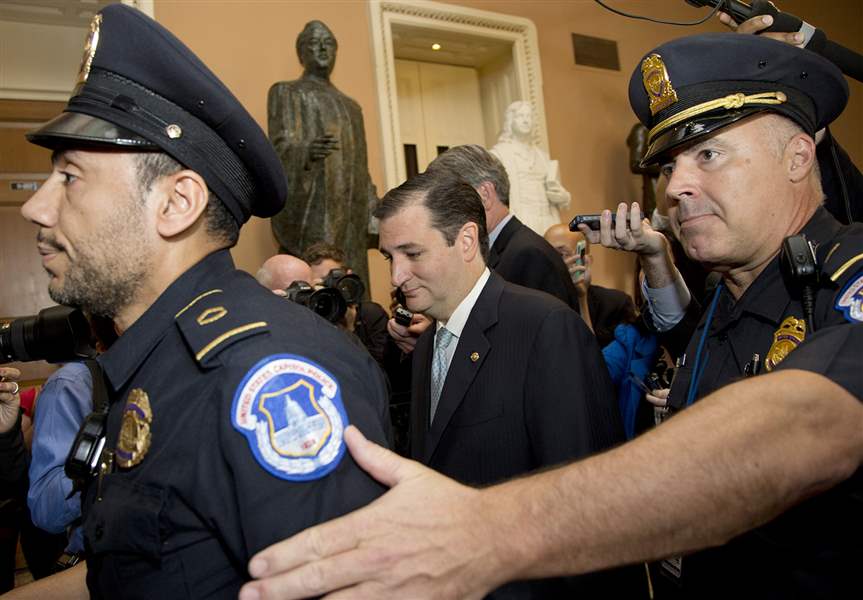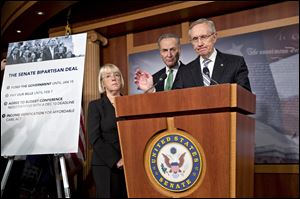
Deal reached in shutdown
Funding approved into 2014
10/17/2013
Sen. Ted Cruz (R., Texas) walks with security on Capitol Hill in Washington. A bipartisan deal prevented a possible federal default and ended the partial government shutdown after 16 days.
ASSOCIATED PRESS

Sen. Ted Cruz (R., Texas) walks with security on Capitol Hill in Washington. A bipartisan deal prevented a possible federal default and ended the partial government shutdown after 16 days.
WASHINGTON — Congress passed legislation late Wednesday night to avoid a national default and end the 16-day partial government shutdown, sending the measure to President Obama to culminate a political drama that placed the U.S. economy at risk.
The Senate voted first, 81-18, clearing the way for a final 285-144 vote in the Republican-controlled House about two hours later.
Mr. Obama hailed the deal.
“Once this agreement arrives on my desk I will sign it immediately and we will begin reopening the government immediately, and we can begin to lift this cloud of uncertainty and unease from our businesses and the American people,” he said.
The legislation permits the Treasury to borrow normally through Feb. 7 or perhaps a month longer and fund the government through Jan. 15.
More than 2 million federal workers would be paid — those who had remained on the job and those who had been furloughed.
The White House budget office said federal workers should plan to return to work today.
Earlier on Wednesday the stock market surged higher at the prospect of an end to the crisis.
The Dow Jones climbed 205.82 points, or 1.4 percent, to 15,373.83. The S&P 500 gained 23.48, or 1.4 percent, at 1,721.54. That’s only four points below its record close of 1,725.52 set Sept. 18. The Nasdaq composite climbed 45.42, or 1.2 percent, to 3,839.43.
As the Oct. 17 debt-limit deadline had approached, there were warnings from European officials as well as bankers in this country that failure to raise the debt limit invited an economic disaster far worse than the near-meltdown of 2008.
On Tuesday, the Fitch credit rating agency said it was reviewing its AAA rating on U.S. government debt for possible downgrade.
Republicans conceded defeat after a long struggle.
“We fought the good fight. We just didn’t win,” House Speaker John Boehner (R., Ohio) conceded as lawmakers lined up to vote on a bill that includes nothing for GOP lawmakers who had demanded to eradicate or scale back Mr. Obama’s signature health care overhaul.

Senate Majority Leader Harry Reid (D., Nev.) speaks with reporters after voting on a measure to avert a threat-ened Treasury default and reopen the government after a partial, 16-day shutdown at the Capitol in Washing-ton as Sen. Patty Murray (D., Wash.) and Sen. Chuck Schumer (D., N.Y.) listen.
“The compromise we reached will provide our economy with the stability it desperately needs,” said Senate Majority Leader Harry Reid (D., Nev.), declaring that the nation “came to the brink of disaster” before sealing an agreement.
Senate Republican leader Mitch McConnell (R., Ky.), who negotiated the deal with Mr. Reid, emphasized that it preserved a round of spending cuts negotiated two years ago with Mr. Obama and Democrats.
As a result, he said, “government spending has declined for two years in a row” for the first time since the Korean War. “And we’re not going back on this agreement,” he added.
The Senate plan does not include any major changes to the Affordable Care Act, a victory for Democrats and a repudiation of Republicans who for weeks tried to use the threat of a shutdown and potential default to force changes in the law.
Mr. Boehner said that Republicans nevertheless would continue in other ways to try to force Mr. Obama to slow or repeal portions of his health-care law.
Sen. Ted Cruz (R., Texas) who staged a marathon 21-hour speech earlier in the fiscal fight, criticized the Senate deal and chided Senate Republicans for not fighting harder to support the House GOP in its fight for concessions on the health-care law.
The bill would set up a conference committee to negotiate broader budget issues, such as whether to replace the deep federal budget cuts known as the sequester with other savings.
But its timeline sets up another potential showdown over spending cuts and entitlement programs that will unfold in Congress over the next four months.
In a small concession by Democrats on the Affordable Care Act, Republicans won additional safeguards to ensure that people who receive subsidies to buy health insurance are eligible for them.
The shutdown initially idled about 800,000 workers, but that soon fell to about 350,000 after Congress agreed to let furloughed Pentagon employees return to work.